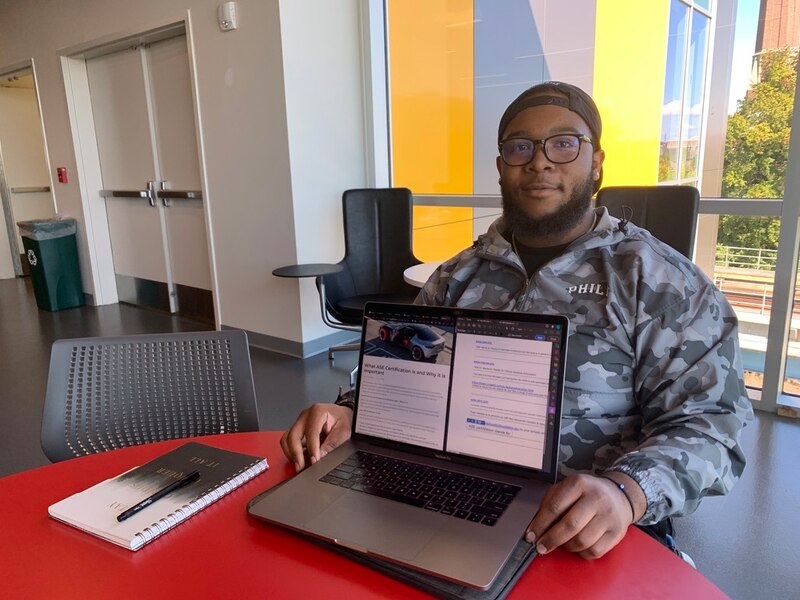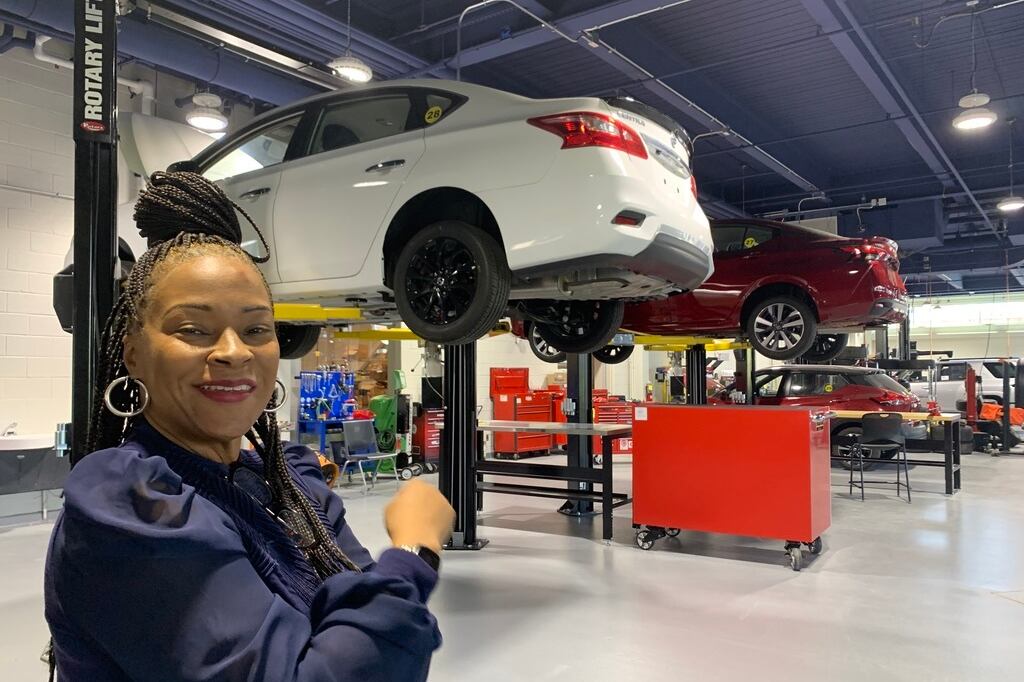Since graduating from First Philadelphia Charter High School in 2018, Kwabena Ankoma-Darko III said he “tried a bunch of things.” He loved learning in general, he explained, especially math, but wasn’t sure how to pursue his education in a way that would lead to interesting work and a productive future.
What wound up being the perfect fit was the automotive and transportation program at the brand new $40 million Career and Advanced Technology Center at Community College of Philadelphia, where he is now in his first semester. “It being hands-on helps a lot,” he said. “I knew with auto technology I could get a secure career.”
The new center, which opened in August at 46th and Market Streets, has dramatically increased opportunities for students to pursue careers in transportation technology, advanced manufacturing and health care, all major industries in the area. Several companies, including Toyota, are directly partnering with community college in an effort to grow its own local workforce and cement its ties to the region.
The increased investment in non-degree trades has been a major goal for Donald Generals, who’s been the president of the community college since 2014. At the dedication of the new building, he called it “a new era” for the institution, which is the most common postsecondary destination for Philadelphia high school graduates.

The center helps those graduates keep pace with new technology in various fields, especially in the automotive industry, which is changing faster than the school district’s programs can keep up with. It’s also designed to help Philadelphia’s K-12 students continue their studies in the city; provide an affordable option to Black and Hispanic students who often have higher college debt; and satisfy a demand for more practical training for “livable wage job opportunities,” said Ayanna Washington, the center’s executive director.
Michelle Armstrong, the school district’s executive director of career and technical education, said that as technology is becoming a bigger part of the automotive industry, the new center helps students “build on the skills that they are learning in the classroom and be prepared for this high-tech, high-paying field.”
But the center also aims to not just prepare students for that work, but serve as a hub so they experience that work directly. Washington said its partnerships with companies like Toyota and Honda, but also with organizations like the local transit authority SEPTA, “make things tangible” to students, so they can see real job possibilities after graduation.
“Everything is informed by industry,” she said, adding that students “want to go to school for something that means something.”
The cost for Philly residents taking four courses at the college, including tuition and various fees, amounts to less than $3,000 a semester. Washington said there are “a plethora” of scholarships available to students.
The college has long had trade programs, but these were competing with more robust offerings and modernized facilities at community colleges and private schools outside the city. She said Generals wanted to make sure that students in the city would not have to go elsewhere to access training in skills that interested them.
Washington, who has worked for 20 years in higher education, said the center was financed primarily through tax credits. The biggest source of funding came through the federal New Market Tax Credits Act that is designed to bring new investment to low-income communities
Many of the labs in the new center have floor-to-ceiling windows by design, she said, in order to create “a scenario where everyone can see what everyone else is doing,” and expand student interests and knowledge in the community about what is available, she said.
How coursework leads to regular work
CCP now offers 40 certificate programs at the new center, including in health care management, advanced manufacturing, and transportation technology fields, with emphasis on keeping up with new technology as the automotive program is doing.
While there are five automotive technology programs in Philadelphia high schools through which they can earn certifications, the college’s new automotive program takes it a step further. For instance, students will be able to specialize in heavy truck maintenance, a program that will start in the spring.
Dan Reed, one of the instructors, said that during the two-year program, students take basic courses and gradually specialize in areas like steering, suspension, and electrical systems. They can also be certified in alternative fuels. The college’s automotive center has 12 bays and two car lifts. (The bathrooms near the automotive area are all-gender, part of the college’s broader effort to attract young women to the lucrative field.)
The programs’ connections with outside organizations, including large companies, are planned out in notable detail. As part of the college’s partnership with Toyota through the Career and Advanced Technology Center, students can spend three days in class and three days at a dealership — for which they are paid — to apply what they learn to a real working environment.
Students who do this are in a better position to be hired after they achieve their certifications and meet other qualifications. Faculty at the college interview students first to make sure they’re ready for working at dealerships. They also need to have a driver’s license and pass a drug test. And they have to have college-level reading and math skills.
There are 160 students at the center now, all in the auto technology program. The other programs in advanced manufacturing and health care will ramp up in the spring and include courses in trades ranging from welding to CNC, which is the use of machining tools that are controlled through computer software.
In the center’s health education offerings, there are courses leading to certification as a nurse’s aide and for other positions in pharmacies and sterile processing.
Students can also take general education courses at the new campus along with those leading to certificates in the trades.
Overall, the new Career and Advanced Technology Center building has a capacity for more than 800 students. Total enrollment at the college is more than 19,000.
The center has also considered the area outside its doors in addition to the students inside. It has a fabrication laboratory — known as a “fab lab” — that is open to the community with a 3-D printing and milling machine (which cuts a variety of materials including iron and aluminum to make parts), Washington said. The fab lab is meant to be a community resource for entrepreneurs and innovators, in addition to the students.
Students can earn an associate’s degree along with their credentials in various trades, and general education courses are also available at the center. They can get credits for courses in fields like engineering, design, and construction.
How the center attracts Philadelphia students
Zafir Saunders, who is still considering his options after high school, is the kind of student the new center seeks to attract.
Saunders, 16, is a sophomore at Edison High School/Fareira Skills Center, which has the most skilled trades programs of any high school in the city — more even than Dobbins, Mastbaum, and Randolph high schools, which are the district’s designated career and technical education centers.
Edison’s career and technical education courses are the reason Saunders stays in school. The opportunity to pursue automotive technology classes in high school, and maybe also at community college, has made the difference for him, he said.
Saunders went to car shows as a child and fixed up antique cars with his dad. But he added, “I grew up hard. I was easily influenced by a lot of stuff.”
Now his dream is to eventually open a car dealership.
“If this wasn’t here, I don’t know what would have happened,” Saunders said. He is looking forward to his school’s Nov. 3 field trip to the new advanced technology center.
Those who work with students like Saunders think the new center will make a good impression. Sasha Singh, who teaches automotive tech at Edison, said the first time he saw the new center, “I told my coworkers, ‘I wish I was 18 again.’ It’s mind boggling.”
Patrick Peiffer, his counterpart at Mastbaum, noted that the center’s instructors at the college are teaching how to maintain and repair electric and hybrid vehicles. “These guys are state of the art. It’s a whole new world,” Peiffer said, adding that the new center “speaks to the demand for skilled talent in the industry.”
Like Saunders, Ankoma-Darko considers Community College’s trade programs to be a life changer.
He travels from Northeast Philadelphia to the Career and Advanced Technology Center, where, he said, he has a good relationship with faculty and can get one-on-one attention.
“In my first semester here, I can see the future,” he said. “I want to be a part of it.”
Dale Mezzacappa is a senior writer for Chalkbeat Philadelphia, where she covers K-12 schools and early childhood education in Philadelphia. Contact Dale at dmezzacappa@chalkbeat.org






